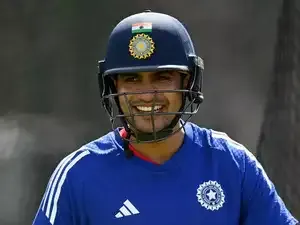Few roles in cricket come with as much scrutiny as leading India in a Test series in foreign conditions — and for Shubman Gill, the pressure has arrived in full force.
When Gill was appointed the captain of India’s Test team, he had no prior experience of leading the national team. His only leadership experience at the top level came in the IPL, where he led Gujarat Titans for the last two seasons. And it showed in the first Test at Headingley where he let England chase down 371 in the fourth innings with such ease that it never felt like India were in the game at all.
But it didn’t affect Gill’s batting as he went on to score a brilliant century in his debut Test as captain in Leeds and followed it up with 269 and 161 in the second as India out-batted England in Birmingham to level the series. And it somewhat couched his captaincy flaws, too.
By the time the third Test moved closer to conclusion, though, the pressure of captaincy had started to show on Gill. It didn’t help that he could only score a total of 22 runs across two innings. Usually not the one to indulge in on-field theatrics, Gill had a rare on-field exchange with Zak Crawley just before stumps on day three. That’s what the pressure of a long Test series does to players, nudging them towards breaking their character.
"Honestly, physically it’s been less tiring — mentally, it’s been more exhausting. As a player, you’re usually just waiting for something to happen, waiting for the ball to come to you. But as captain, you’re thinking all the time. You’re mentally more involved,” Gill said about his experience of leading the side in three Tests.
Gill began the series with a calm head and a mountain of runs to avoid the traps of expectation that often unsettle new Test captains, as well as the desperation to earn the respect of teammates. It showed that he could stay in the present, not allowing the anxiety about the future to muddle his thinking. Now, with India trailing 1-2 and the series on the line, he must show that he can also handle the pressure of setbacks.
Coming to England, Gill didn’t carry any scars. He had played only two Tests before he made his captaincy debut on June 20 — a one-off Test in 2022 against England and the World Test Championship final against Australia in 2023. India lost both of those Tests, but Gill was the youngest and least experienced player in that team, shielded from the criticism. In that sense, the Punjab lad entered the England series with a clean slate.
As India head into the fourth Test, however, Gill’s team is not only carrying mental bruises of recent defeats and disappointments that could have been avoided with slightly better application on the field, but also physical injuries that have forced the team management to rethink their playing combination.
India will be without Nitish Kumar Reddy, a batting allrounder who bowls seam up, which could have been very helpful in Manchester where a pacer-friendly pitch awaits the two teams. Reddy, nursing a knee injury, will take no further part in the series and return home for the treatment.
Akash Deep, India’s bowling hero in the second Test, has been ruled out with a groin injury. Left-arm pacer Arshdeep Singh’s long-awaited debut has been derailed due to hand injury he suffered in nets.
“Never easy when there is a bit of injuries going on in the squad, but I think we have got enough good players in the team to be able to get 20 wickets,” said Gill at the pre-match press conference.
There was some good news, too. Gill confirmed that his deputy Rishabh Pant’s finger has healed enough for him to keep wickets.
The fourth Test has the potential of taking away the series from India. How Gill navigates this tough phase with a depleted squad, rising expectations and mounting pressure could be the first real test of his long-term captaincy credentials.
When Gill was appointed the captain of India’s Test team, he had no prior experience of leading the national team. His only leadership experience at the top level came in the IPL, where he led Gujarat Titans for the last two seasons. And it showed in the first Test at Headingley where he let England chase down 371 in the fourth innings with such ease that it never felt like India were in the game at all.
But it didn’t affect Gill’s batting as he went on to score a brilliant century in his debut Test as captain in Leeds and followed it up with 269 and 161 in the second as India out-batted England in Birmingham to level the series. And it somewhat couched his captaincy flaws, too.
By the time the third Test moved closer to conclusion, though, the pressure of captaincy had started to show on Gill. It didn’t help that he could only score a total of 22 runs across two innings. Usually not the one to indulge in on-field theatrics, Gill had a rare on-field exchange with Zak Crawley just before stumps on day three. That’s what the pressure of a long Test series does to players, nudging them towards breaking their character.
"Honestly, physically it’s been less tiring — mentally, it’s been more exhausting. As a player, you’re usually just waiting for something to happen, waiting for the ball to come to you. But as captain, you’re thinking all the time. You’re mentally more involved,” Gill said about his experience of leading the side in three Tests.
Gill began the series with a calm head and a mountain of runs to avoid the traps of expectation that often unsettle new Test captains, as well as the desperation to earn the respect of teammates. It showed that he could stay in the present, not allowing the anxiety about the future to muddle his thinking. Now, with India trailing 1-2 and the series on the line, he must show that he can also handle the pressure of setbacks.
Coming to England, Gill didn’t carry any scars. He had played only two Tests before he made his captaincy debut on June 20 — a one-off Test in 2022 against England and the World Test Championship final against Australia in 2023. India lost both of those Tests, but Gill was the youngest and least experienced player in that team, shielded from the criticism. In that sense, the Punjab lad entered the England series with a clean slate.
As India head into the fourth Test, however, Gill’s team is not only carrying mental bruises of recent defeats and disappointments that could have been avoided with slightly better application on the field, but also physical injuries that have forced the team management to rethink their playing combination.
India will be without Nitish Kumar Reddy, a batting allrounder who bowls seam up, which could have been very helpful in Manchester where a pacer-friendly pitch awaits the two teams. Reddy, nursing a knee injury, will take no further part in the series and return home for the treatment.
Akash Deep, India’s bowling hero in the second Test, has been ruled out with a groin injury. Left-arm pacer Arshdeep Singh’s long-awaited debut has been derailed due to hand injury he suffered in nets.
“Never easy when there is a bit of injuries going on in the squad, but I think we have got enough good players in the team to be able to get 20 wickets,” said Gill at the pre-match press conference.
There was some good news, too. Gill confirmed that his deputy Rishabh Pant’s finger has healed enough for him to keep wickets.
The fourth Test has the potential of taking away the series from India. How Gill navigates this tough phase with a depleted squad, rising expectations and mounting pressure could be the first real test of his long-term captaincy credentials.





